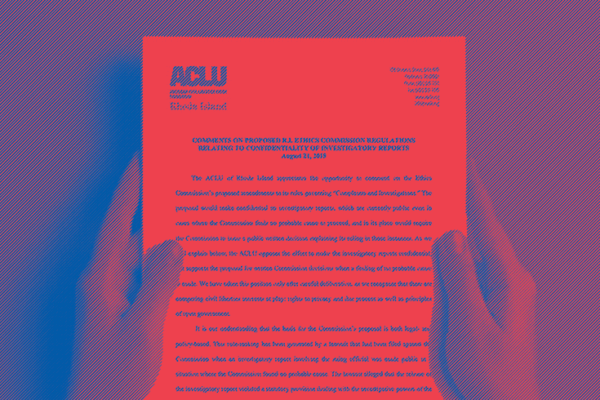Help us protect civil liberties here in RI
Make an end-of-year tax-deductible donation to support our work in the courts and the community!


CAMPAIGN: Flock Safety Surveillance Technology
Last updated on July 20, 2022
CAMPAIGN: Flock Safety Surveillance Technology
Since August of 2021, when three municipalities in Rhode Island – Cranston, Pawtucket, and Woonsocket – began secretly instituting a broad network of expansive surveillance technology, owned and operated by the company Flock Safety, the ACLU of RI has been engaged in efforts to both halt the implementation of this technology and to urge municipalities and state leaders to put in place meaningful restrictions on the future consideration of any surveillance.
Expansiveness of the Technology
As typically occurs with surveillance technology, the actual capabilities of these cameras have been severely underplayed by police representatives over the past few months. The joint release issued by the police departments of Cranston, Woonsocket, and Pawtucket in August 2021 illustrated this issue, with the release reducing the abilities of the Flock Safety cameras to simply say that they “capture still photographs of license plates and vehicle characteristics as they travel on public roads.” It is true that these cameras record and store both of these aspects, but the realities of the expanded abilities of this technology are far more alarming and troubling:
- Flock Safety’s website elaborates on what “vehicle characteristics” further entails, noting that its surveillance system allows police to search by “vehicle type, make, color, license plate state, missing/covered plates, and other unique features like bumper stickers, decals, and roof racks.” (emphasis added) Since every police department that is part of the Flock Safety system has access to the data collected by other participating agencies, the opportunity for targeted and widespread surveillance is multiplied.
- This is not purely a passive system that merely alerts police when a license plate that is photographed matches a vehicle in the NCIC system, for example. Police can input any license plate number or vehicle characteristic into the system and pull out any information about that vehicle’s movements over a lengthy period of time in any community where the cameras are being used.
- In addition, the capabilities of this technology go far beyond the exclusive capturing of visual data. Flock Safety’s website advertises the ability to search by “audio evidence” and “contextual evidence,” which includes “screeching tires” and “associated vehicles,” implying that these systems capture audio in addition to video and utilize artificial intelligence to determine which vehicles in a certain area may be linked to one another. Both of these uses, beyond the already invasive capabilities of the video capturing, signify a profound overreach of this technology and invite over-policing and misuse.
- In the absence of legislation as the scope of this technology expands, the privacy rights of Rhode Islanders will be solely at the mercy of police departments and a private company. Especially since the overturning of Roe v. Wade, where interstate travel and any data gathered therefrom has become an incredibly sensitive issue, the urgency of this lack of data security has never been more clear or salient.
Racial Discrimination & First Amendment Rights
Finally, separating the history of surveillance in the United States from racial discrimination is impossible because they are inextricably bound. Communities of color have disproportionately experienced the egregious effects of limitless surveillance, and this is not purely an historical lesson. In the last two years, First Amendment rights and racial discrimination have been entwined with the expanded use of surveillance tools. For example, municipal law departments were found to have used surveillance camera footage to inappropriately monitor activists during the Black Lives Matter protests of summer 2020. In short, the abuse of surveillance technology is not hypothetical. Given the swath of current capabilities that Flock Safety advertises – and the ones which it could add in the future – we are extremely concerned that this technology could facilitate similar police activity in Rhode Island.
This campaign covers the many strategies that our affiliate has undertaken to halt the use of this technology. We urge all Rhode Islanders to contact their state legislators and municipal officials and similarly ask them to curb expansive surveillance in the Ocean State.
Documents
- September 2021 Letter to Cranston.pdf
- September 2021 Letter to Pawtucket.pdf
- September 2021 Letter to Woonsocket.pdf
- March 2022 Providence City Council Flock Safety Letter.pdf
- May 2022 Letter on Flock Safety - Warwick.pdf
- July 2022 Commentary on Portsmouth Flock Safety Consideration.pdf
- July 2022 Commentary on Providence Police Department Draft ALPR Policy.pdf
- July 2022 ACLU of RI Supportive Commentary on Providence Resolution 37483.pdf
- August 2022 - Letter to Warwick City Council re: Flock Safety
- August 2022 Letter to Rhode Island Turnpike and Bridge Authority.pdf
- September 2022 Letter to Warwick City Council.pdf
- December 2022 Commentary on Flock Safety Expansion in Providence.pdf
Related Issues
Related Content

- Privacy & Technology|
- +2 Issues
ACLU Statement on the Rejection of Flock Safety Surveillance Cameras by Portsmouth Town Council

- Privacy & Technology|
- +2 Issues
LETTER: Re: ALPR Use by Law Enforcement in Cranston, Pawtucket & Woonsocket

- Privacy & Technology|
- +2 Issues
ACLU Calls on Cranston, Pawtucket, and Woonsocket to Halt ALPR Camera Program

- Privacy & Technology
